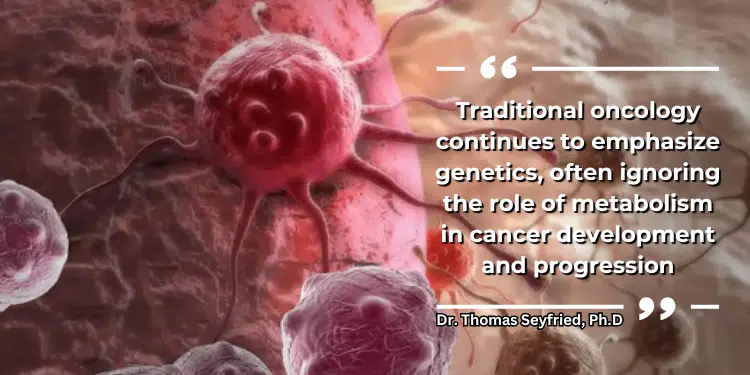Cancer has become one of the leading causes of death worldwide, yet there is still much confusion and controversy about its underlying causes.
While traditional medicine often focuses on genetic mutations as the primary culprit, groundbreaking research in cancer metabolism is revealing a different story – one that challenges the mainstream narrative.
Dr. Thomas Seyfried, Ph.D., a professor of biology at Boston College and a leading expert in cancer metabolism, has spent years researching the connection between cellular energy, cancer, and the role of diet.
His findings suggest that many doctors and healthcare systems may be overlooking key contributors to cancer development, potentially leaving patients without access to transformative preventive strategies.
Cancer: A Metabolic Disease, Not Just a Genetic One
Dr. Seyfried is a prominent advocate for the idea that cancer is primarily a metabolic disease, not solely a genetic one. In his groundbreaking book Cancer as a Metabolic Disease, he explains that cancer cells thrive due to defects in how they produce energy.
The Metabolic Connection:
- Normal cells generate energy through oxidative phosphorylation in the mitochondria.
- Cancer cells, however, rely on glycolysis, a less efficient process that breaks down glucose for energy, even in the presence of oxygen—a phenomenon known as the Warburg effect.
- This metabolic dysfunction leads to uncontrolled growth, a hallmark of cancer.
According to Seyfried, the genetic mutations observed in cancer cells may be secondary effects, not the root cause.
Yet, traditional oncology continues to emphasize genetics, often ignoring the role of metabolism in cancer development and progression.
What Doctors May Be Overlooking
1. Diet and Cancer’s Sugar Addiction
One of Dr. Seyfried’s most compelling arguments is that sugar plays a significant role in fueling cancer.
Cancer cells consume glucose at a much higher rate than normal cells, making sugar a primary energy source for tumor growth.
Why It’s Ignored:
- The standard medical approach rarely considers dietary interventions as part of cancer treatment.
- Many doctors are not trained in nutritional therapy or the science of cancer metabolism.
2. Chronic Inflammation and Cancer
Chronic inflammation creates a fertile environment for cancer to thrive. Factors like poor diet, obesity, and a sedentary lifestyle contribute to systemic inflammation, which can damage cells and promote tumor development.
Why It’s Ignored:
- Conventional treatments like chemotherapy and radiation target tumors directly but often fail to address underlying inflammatory processes.
3. Environmental Toxins
Exposure to carcinogens in the environment, such as pesticides, heavy metals, and endocrine-disrupting chemicals, is a significant but often overlooked factor in cancer risk.
Why It’s Ignored:
- The healthcare system focuses more on treatment than prevention, and addressing environmental causes would require large-scale systemic changes.
The Role of Nutritional Ketosis in Cancer Prevention and Treatment
Dr. Seyfried is a strong proponent of nutritional ketosis – a metabolic state where the body uses ketones (produced from fats) instead of glucose for energy.
He argues that a ketogenic diet, which is high in healthy fats and very low in carbohydrates, could be a powerful tool against cancer.
Why the Ketogenic Diet Helps:
- Starves cancer cells of glucose, their primary fuel source.
- Reduces inflammation, a key driver of cancer.
- Supports healthy mitochondrial function, which is essential for preventing cancerous changes in cells.
Clinical studies have shown that the ketogenic diet can slow tumor growth and improve the effectiveness of conventional treatments. Yet, this approach remains underutilized in mainstream oncology.
Why Doctors Stick to the Status Quo
1. Lack of Training in Nutrition and Metabolism
Most medical schools provide limited education on nutrition, leaving many doctors ill-equipped to explore dietary interventions for cancer prevention or treatment.
2. Focus on Pharmaceutical Solutions
The healthcare industry is heavily influenced by pharmaceutical companies, which prioritize drugs and therapies over lifestyle-based interventions.
3. Resistance to New Paradigms
Cancer treatment is rooted in decades of focusing on genetic mutations and aggressive treatments like chemotherapy and radiation. Shifting this paradigm to include metabolic approaches requires a significant change in mindset.
The Way Forward: A Holistic Approach to Cancer Prevention
To reduce cancer risk and improve outcomes, it’s time to adopt a more comprehensive approach that includes:
- Dietary Changes: Embrace a low-sugar, anti-inflammatory diet rich in whole, unprocessed foods.
- Exercise: Regular physical activity can reduce inflammation and improve mitochondrial health.
- Detoxification: Minimize exposure to environmental toxins through clean eating and natural cleaning products.
- Nutritional Ketosis: Consider a ketogenic or low-carb diet under the guidance of a healthcare professional.
Dr. Seyfried’s work underscores the importance of empowering patients with knowledge about how lifestyle changes can influence their health.
The real truth about cancer is that it’s not just about genetics – it’s deeply connected to metabolism, lifestyle, and environmental factors.
While the mainstream medical community has made incredible strides in cancer treatment, it’s time to expand the conversation to include the groundbreaking research of experts like Dr. Thomas Seyfried.
By understanding and addressing the metabolic roots of cancer, we can pave the way for more effective prevention strategies and empower individuals to take control of their health.
Share this article to help spread awareness of this critical perspective and inspire others to explore new ways to prevent and combat cancer.
